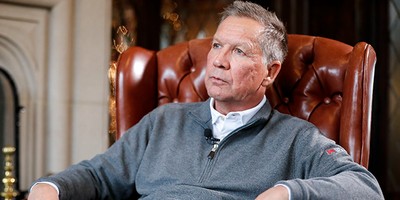In these days of news cycles measured in minutes, if not seconds, the Katie Couric scandal may seem almost as stale as Katie Couric herself. But bear with me. It's a big deal, and not just because she lied. But let's begin with the lie.
Serving as host and executive producer for an anti-gun "news" documentary, "Under the Gun," Couric held a focus group with members of a gun rights group called the Virginia Citizens Defense League.
She asked the attendees, "If there are no background checks for gun purchasers, how do you prevent felons or terrorists from walking into, say, a licensed gun dealer and purchasing a gun?"
In reality the group had any number of immediate and thoughtful responses (whether you agree with them or not).
But what ended up in the final video was something very different. For eight very long seconds, Couric's question hung in the air as the members of the focus group were depicted as dumbstruck, some with their heads hanging low, as if this question was not only unanswerable, but exposed something shameful.
Couric and her team achieved this through simple video editing. By taking footage from elsewhere in the session and splicing it after the question, they made it seem like the group was struck mute by the brilliance and moral power of the question.
The simplest way to illustrate the nature of this lie is to imagine if a print reporter had been there instead of a camera. Let's say I'm that reporter, watching the focus group in real time from a corner of the room. Now imagine that in my account of the meeting, instead of reporting that the group answered immediately and energetically, I reported: "When Couric asked her question about background checks, a long and shamefaced collective silence fell over the whole group. Not one of these purported gun rights' activists knew how to respond."
There is simply no way a reasonable person can deny that would be a lie.
This incident is being cited by many on the right as a perfect example of media bias -- and it is. Couric is a partisan hypocrite. She criticized the undercover videos of Planned Parenthood executives talking about selling baby parts as deceptively edited, even though the editing was tame compared to Couric's (and the Center for Medical Progress had released the raw video of their interviews as well).
But there's something else worth noting here. TV itself is a biased medium. In the early days of television, and before that radio, the hope was that technology could take out the middleman-journalist and provide "objective" reporting. Just place a microphone or a camera at the heart of the action, and the audience will get that "You Are There" feeling. The problem is that the camera and the microphone are very often less objective than the pen or the keyboard. Worse, electronic journalists often hide behind the facade of technology and the sensory immersion of the audience, as a way to fake immediacy and intimacy.
Writing requires reflection; the writer must balance competing and often contradictory facts and opinions. It demands of the reader active judgment as well. Lord knows it's not perfect, but in many respects it's more honest than journalism that pretends to let you see and hear the truth with your own eyes and ears.
"You Are There," by the way, was a radio and then TV series (which was hosted by Walter Cronkite) put out by CBS News from the late 1940s to the early 1950s. It was dedicated to re-enacting important moments in American history, as if they had been covered by TV journalists. But the one thing the audience knew: It was a re-enactment.
Today, all of reality TV is at least as fake as "You Are There" -- arguably more so, since at least "You Are There" tried to stick to established historical facts. Reality TV, on the other hand, makes up facts and pretends they are real. In this it is perhaps the medium's most authentic form: it's just "real-ish" enough to make the fakery more emotionally compelling.
This is the more lasting lesson of the Couric scandal. Reality TV has conquered all. As a society, we want to be entertained far more than we want to be informed, which is why these scandals vanish the instant they become boring. It's also why Katie Couric is more of a reality TV star than a real journalist.

























Join the conversation as a VIP Member